Kristine Hughes's Blog, page 165
December 26, 2010
Heaven, I'm In Heaven . . .
We made it, we're in London! Woo Hoo! No problems with the flight, arrived at our hotel around 11:30 a.m. and the room was ready. Unpacked and went to Victoria Station to get some money from the ATM, then on board the Hop On, Hop Off tour bus for a whirlwind trip round London. We crossed the Thames four times!? Wow, was Oxford Circus and Regent Street packed with people. Hamley's was jammed. Harrod's closed today - jinormous sale starts tomorrow. You can bet we won't be there. We plan to do the alternate bus tour tomorrow, then the river cruise, then the Tower, then dinner at Ye Olde Cheshire Cheese, then the Ripper Walk with Donald Rumbleow. It's cold here, but no worse than New Jersey.
Had dinner in the carvery here in the hotel - roast beef, Yorkshire pudd, gravy, veg and dessert - straight down the road to Gouts-ville, but who cares? Met a wonderful couple at the next table, got to talking about how I love UK telly, they love US telly, neither of us can access the other and so we've made a Devil's Bargain to email each other links to our favorite shows. We'll get around these restrictions or die trying. Speaking of which, Upstairs, Downstairs debuts here tonight, Antiques Roadshow is also on and they told me how to access the Royle Family Xmas special here (BBC Iplay, which you can't access from the States, hence the Devils' Pact). After dinner, Greg and I walked down the street to Buckingham Palace to see it lit up at night yes, Vicky, I did yell "Chuck!" even though I know he's not there. One day . . .
There are gobs of William and Kate tat in the stores here already (yipppeee!) and I'm on the verge of tears every time I see a pub or currency exchange bureau. I know, crazy. Oh, btw, we were on the bus tour and I was telling Greg (or so I thought) about the In and Out Club in Piccadilly and the tour guide overheard me and asked, "How do you know about the In and Out Club/Melbourne House?" and so he turned off his mike and we started talking about the Melbournes and Palmerstons, about Artie's having been at England's first railroad fatality, about the Marble Arch, Lady Caro Lamb, etc etc etc . . . . . God, it's good to be home. As you can see, the laptop is functioning fine, so I'll be posting more about our trip tomorrow. Off to shower and watch Upstairs, Downstairs. I know I shouldn't rub it in, but I promise to tell you all tomorrow. I can't wait to see Rose . . . .
Had dinner in the carvery here in the hotel - roast beef, Yorkshire pudd, gravy, veg and dessert - straight down the road to Gouts-ville, but who cares? Met a wonderful couple at the next table, got to talking about how I love UK telly, they love US telly, neither of us can access the other and so we've made a Devil's Bargain to email each other links to our favorite shows. We'll get around these restrictions or die trying. Speaking of which, Upstairs, Downstairs debuts here tonight, Antiques Roadshow is also on and they told me how to access the Royle Family Xmas special here (BBC Iplay, which you can't access from the States, hence the Devils' Pact). After dinner, Greg and I walked down the street to Buckingham Palace to see it lit up at night yes, Vicky, I did yell "Chuck!" even though I know he's not there. One day . . .
There are gobs of William and Kate tat in the stores here already (yipppeee!) and I'm on the verge of tears every time I see a pub or currency exchange bureau. I know, crazy. Oh, btw, we were on the bus tour and I was telling Greg (or so I thought) about the In and Out Club in Piccadilly and the tour guide overheard me and asked, "How do you know about the In and Out Club/Melbourne House?" and so he turned off his mike and we started talking about the Melbournes and Palmerstons, about Artie's having been at England's first railroad fatality, about the Marble Arch, Lady Caro Lamb, etc etc etc . . . . . God, it's good to be home. As you can see, the laptop is functioning fine, so I'll be posting more about our trip tomorrow. Off to shower and watch Upstairs, Downstairs. I know I shouldn't rub it in, but I promise to tell you all tomorrow. I can't wait to see Rose . . . .
Published on December 26, 2010 11:28
Basildon Park Rebirths
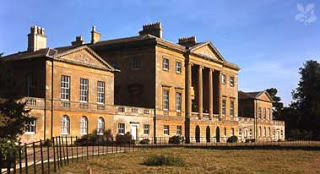 Basildon Park is in Berkshire overlooking the lovely Thames Valley, built in the 1770's in the strict Palladian style by architect John Carr of York.
Basildon Park is in Berkshire overlooking the lovely Thames Valley, built in the 1770's in the strict Palladian style by architect John Carr of York. 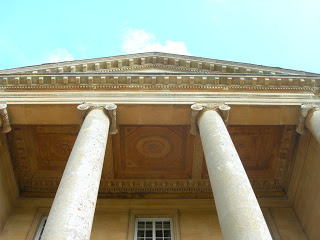 Basildon Park was abandoned about 1910 and stripped of its furnishings even including flooring, fireplace surrounds and woodwork. It was used to house troops or prisoners in both world wars. Some rooms were removed and reconstructed in the Waldorf Astoria Hotel in New York City (ballroom, below).
Basildon Park was abandoned about 1910 and stripped of its furnishings even including flooring, fireplace surrounds and woodwork. It was used to house troops or prisoners in both world wars. Some rooms were removed and reconstructed in the Waldorf Astoria Hotel in New York City (ballroom, below).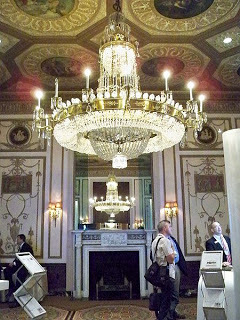 Basildon Park stood mostly empty and deteriorating until 1952 when Lord and Lady Iliffe, a newspaper tycoon and his wife, rescued the house. Lady Iliffe writes, "To say it was derelict is hardly good enough: no window was left intact, and most were repaired with cardboard or plywood; there was a large puddle on the Library floor, coming from the bedroom above, where a fire had just been stopped in time; walls were covered with signatures and graffiti from various occupants….It was appallingly cold and damp. And yet, there was still an atmosphere of former elegance, and a feeling of great solidity. Carr's house was still there, damaged but basically unchanged."
Basildon Park stood mostly empty and deteriorating until 1952 when Lord and Lady Iliffe, a newspaper tycoon and his wife, rescued the house. Lady Iliffe writes, "To say it was derelict is hardly good enough: no window was left intact, and most were repaired with cardboard or plywood; there was a large puddle on the Library floor, coming from the bedroom above, where a fire had just been stopped in time; walls were covered with signatures and graffiti from various occupants….It was appallingly cold and damp. And yet, there was still an atmosphere of former elegance, and a feeling of great solidity. Carr's house was still there, damaged but basically unchanged."Views of the outside show the Bath stone construction. The Palladian window in the Garden Front is in the Octagon Room.
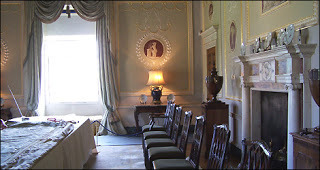 The Iliffes were fortunate enough to find genuine Carr fireplaces and woodwork removed from other houses, mostly in Yorkshire. Carr employed meticulous craftsmen and used standard measurements so that the pieces were virtually interchangeable.
The Iliffes were fortunate enough to find genuine Carr fireplaces and woodwork removed from other houses, mostly in Yorkshire. Carr employed meticulous craftsmen and used standard measurements so that the pieces were virtually interchangeable. 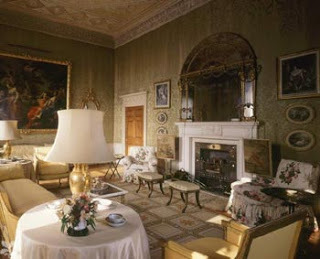 Again, Lady Iliffe: "Carr was such a precise architect that his mahogany doors from Panton (in Lincolnshire) fitted exactly in the sockets of the missing Basildon ones." Thus Basildon is both authentic and a recreation in one.
Again, Lady Iliffe: "Carr was such a precise architect that his mahogany doors from Panton (in Lincolnshire) fitted exactly in the sockets of the missing Basildon ones." Thus Basildon is both authentic and a recreation in one.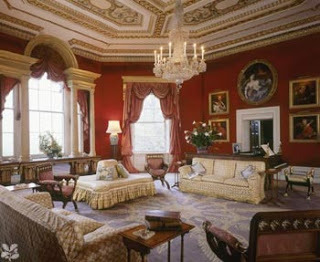
Lady Iliffe collaborated with leading designers of the English Country House style of decorating to fit out the house with a combination of antiques and contemporary pieces, including the inevitable floral chintzes that simply drip with that country house charm. Right, the Octagon Room interior.
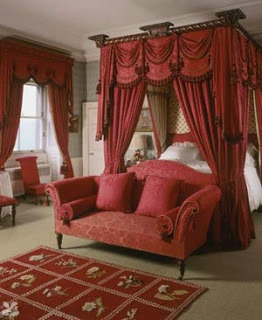 Upstairs the generously sized rooms were adapted to alternating bedrooms and huge bathrooms. It is a bit of a shock to see one of the perfectly proportioned rooms with its decorative plaster ceiling and elaborate woodwork and marble fireplace decked out with nothing more than the finest 1950's plumbing fixtures.
Upstairs the generously sized rooms were adapted to alternating bedrooms and huge bathrooms. It is a bit of a shock to see one of the perfectly proportioned rooms with its decorative plaster ceiling and elaborate woodwork and marble fireplace decked out with nothing more than the finest 1950's plumbing fixtures.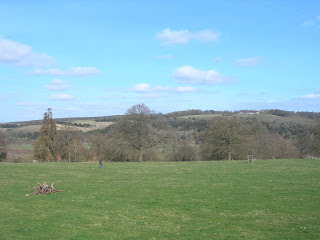 Basildon Park was built between 1776 and 1782 by Sir Francis Sykes, created a baronet in 1781. His roots were in Yorkshire and he chose Carr of York to build his house, a classical Palladian villa with a main block of rooms joined to pavilions on either side. The Sykes fortune was made during his service in India. Right is the view of the countryside.
Basildon Park was built between 1776 and 1782 by Sir Francis Sykes, created a baronet in 1781. His roots were in Yorkshire and he chose Carr of York to build his house, a classical Palladian villa with a main block of rooms joined to pavilions on either side. The Sykes fortune was made during his service in India. Right is the view of the countryside.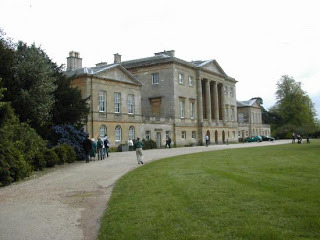 In 1838, the Sykes family sold the house to James Morrison (d. 1857), a Liberal MP who had turned his London haberdashery business into an international concern. By the way, when he was a shopman at Todd and Co., he married his employer's daughter, and eventually took over the firm. Morrison engaged architect John Papworth to design handkerchiefs for his company and later to remodel Basildon. Morrison had acquired a fine collection of paintings and was one of the founding fathers of the National Gallery in London. Papworth worked at Basildon from 1837 to 1842, making some changes to the Octagon Room and other interior designs, all in keeping with the original spirit of Carr's house. Morrison's daughter Miss Ellen Morrison was the last resident before Basildon Park fell into disuse.
In 1838, the Sykes family sold the house to James Morrison (d. 1857), a Liberal MP who had turned his London haberdashery business into an international concern. By the way, when he was a shopman at Todd and Co., he married his employer's daughter, and eventually took over the firm. Morrison engaged architect John Papworth to design handkerchiefs for his company and later to remodel Basildon. Morrison had acquired a fine collection of paintings and was one of the founding fathers of the National Gallery in London. Papworth worked at Basildon from 1837 to 1842, making some changes to the Octagon Room and other interior designs, all in keeping with the original spirit of Carr's house. Morrison's daughter Miss Ellen Morrison was the last resident before Basildon Park fell into disuse.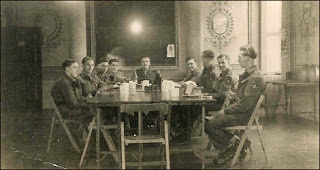 Basildon Park was used to house soldiers during World War II, as were many country houses, and certainly suffered occasional, if not constant, abuse.
Basildon Park was used to house soldiers during World War II, as were many country houses, and certainly suffered occasional, if not constant, abuse.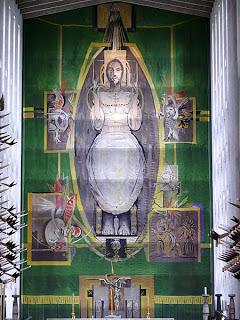 The Iliffes were collectors of the work of the distinguished English artist Graham Sutherland, whose gigantic tapestry adorns the modernist reconstruction of the Coventry Cathedral. (The 14th century cathedral was destroyed in 1940 by German bombs; a modern cathedral was built and filled with works of contemporary art.) A number of Sutherland's paintings and many studies for the tapestry he designed hang at Basildon. The Iliffe family presented the house to the National Trust in 1978.
The Iliffes were collectors of the work of the distinguished English artist Graham Sutherland, whose gigantic tapestry adorns the modernist reconstruction of the Coventry Cathedral. (The 14th century cathedral was destroyed in 1940 by German bombs; a modern cathedral was built and filled with works of contemporary art.) A number of Sutherland's paintings and many studies for the tapestry he designed hang at Basildon. The Iliffe family presented the house to the National Trust in 1978.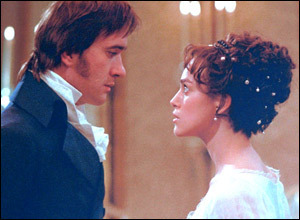 Basildon Park has often served as a set for costume dramas for the BBC and other producers. Here is a scene from the 2005 Pride and Prejudice, where Basildon enacted the role of Netherfield Park.
Basildon Park has often served as a set for costume dramas for the BBC and other producers. Here is a scene from the 2005 Pride and Prejudice, where Basildon enacted the role of Netherfield Park.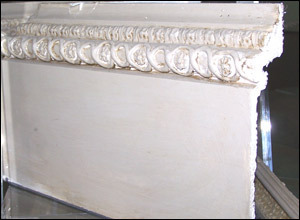 This picture shows how carefully designed temporary baseboards can hide 21th century electrical outlets or cable connections.
This picture shows how carefully designed temporary baseboards can hide 21th century electrical outlets or cable connections.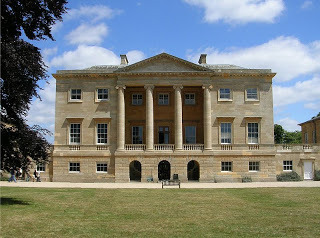
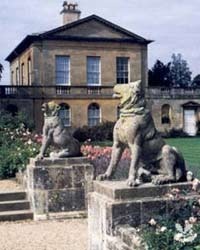 To Basildon Park in Berkshire now in the capable hands of the National Trust, we wish as many more rebirths as necessary to keep out the damp and bring in the tourists.
To Basildon Park in Berkshire now in the capable hands of the National Trust, we wish as many more rebirths as necessary to keep out the damp and bring in the tourists.
Published on December 26, 2010 02:00
December 25, 2010
Merry Christmas!
Our Christmas wishes to you . . . . .
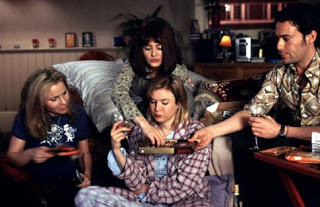
May you always be surrounded by good friends
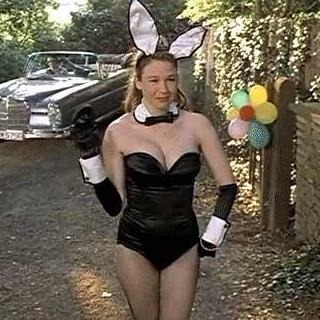
May you always find the perfect thing to wear
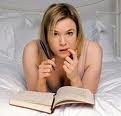
May you always have a good book waiting to be read

May you use your gift cards wisely

May you always be up for new challenges
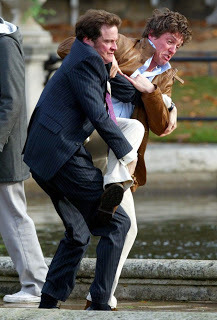
May you experience good will towards men

May you be confident that you are the right size
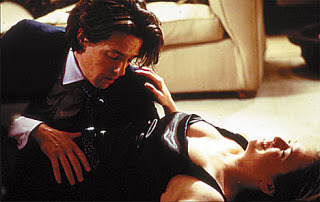
May all your bosses be good ones

May you always have good hair days

May all your travels be first class
and . . . . .
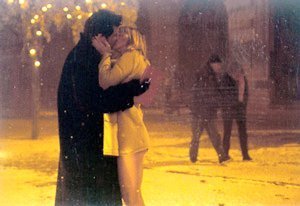
May you always realize your heart's desire
Merry Christmas!


May you always be surrounded by good friends

May you always find the perfect thing to wear

May you always have a good book waiting to be read

May you use your gift cards wisely

May you always be up for new challenges

May you experience good will towards men

May you be confident that you are the right size

May all your bosses be good ones

May you always have good hair days

May all your travels be first class
and . . . . .

May you always realize your heart's desire
Merry Christmas!
Published on December 25, 2010 01:04
December 24, 2010
Upstairs, Downstairs - Original Cast Update
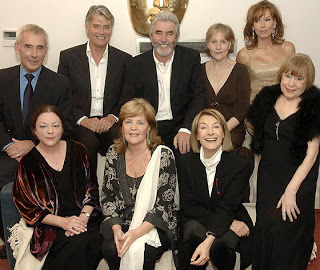
Back-stage group photo from the 50-years BAFTA celebration event from October 2007.
From left to right: Christopher Beeny (Edward), Jacqueline Tong (Daisy), Simon Williams (James), Pauline Collins (Sarah), John Alderton (Thomas), Jean Marsh (Rose/co-creator), Meg Wynn Owen (Hazel), Lesley-Anne Down (Georgina) and Jenny Tomasin (Ruby).
When the original Upstairs, Downstairs aired 40 years ago, the series about life in Edwardian England was watched avidly by 300 million viewers in 50 countries and won five Emmy Awards in the United States. With the beginning of the new series (see our previous post here) to be aired on BBC One and BBC HD on 26th, 27th and 28th December, we got to wondering about what had happened to the original cast members in the intervening years. So, as our Christmas Eve present to you, here's what we've found -
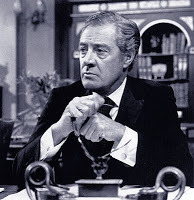 David Langton - Richard Bellamy - After his success in "Upstairs, Downstairs," Mr. Langton appeared on television as a Cabinet minister in "Winston Churchill: The Wilderness Years" in 1981, as Prime Minister Lord Asquith in "Number 10" in 1983, and as Lord Mountbatten in the television film "Charles and Diana: A Royal Love Story" in 1982. Before "Upstairs, Downstairs," the Scottish-born Mr. Langton spent most of his acting career in the theater, playing supporting roles in London's West End, but he also did some film work. Movies in which he appeared included Richard Lester's Beatles film, "A Hard Day's Night," in 1964, "The Pumpkin Eater" in 1964 and "The Whistle Blower," with Michael Caine, in 1986. He died in 1994 at the age of 82.
David Langton - Richard Bellamy - After his success in "Upstairs, Downstairs," Mr. Langton appeared on television as a Cabinet minister in "Winston Churchill: The Wilderness Years" in 1981, as Prime Minister Lord Asquith in "Number 10" in 1983, and as Lord Mountbatten in the television film "Charles and Diana: A Royal Love Story" in 1982. Before "Upstairs, Downstairs," the Scottish-born Mr. Langton spent most of his acting career in the theater, playing supporting roles in London's West End, but he also did some film work. Movies in which he appeared included Richard Lester's Beatles film, "A Hard Day's Night," in 1964, "The Pumpkin Eater" in 1964 and "The Whistle Blower," with Michael Caine, in 1986. He died in 1994 at the age of 82. 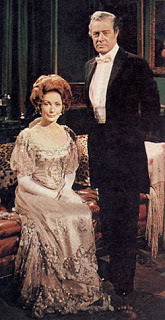 Rachel Gurney - Lady Marjorie Bellamy - After the success of the first two series of Upstairs Downstairs, she decided to move on to other work. The show's writers, who prided themselves on their inclusion of historical events in the narrative, duly wrote her out, and Lady Marjorie left for America on the maiden voyage of the Titanic.
Rachel Gurney - Lady Marjorie Bellamy - After the success of the first two series of Upstairs Downstairs, she decided to move on to other work. The show's writers, who prided themselves on their inclusion of historical events in the narrative, duly wrote her out, and Lady Marjorie left for America on the maiden voyage of the Titanic.After Upstairs Downstairs her television work continued alongside her successful stage career, which included roles in J B Priestley's Dangerous Corner (1974) with Gerald Flood and Barbara Jefford, and Richard III (1989) in which she played the mother of Richard (Derek Jacobi). She was modest modest to a fault - when a producer offered her a part she was inclined to shake her head sadly and murmur: "I'm not really right for it, you know. Why don't you get Faith Brook?" Indeed she had to be persuaded to take the part of Lady Marjorie., a role which generated fan mail for Gurney until the end - she passed away in 2001 at age 81.
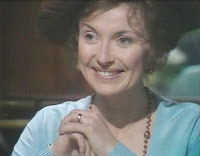
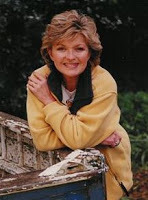 Hannah Gordon - Virginia Bellamy -Gordon was just 33 when she played Viscountess Virginia Bellamy, Richard's second wife. Gordon has kept busy, with roles in television (Midsomer Murder), on the stage and she does a tremendous amount of voice work, everything from animated features such as "Watership Down" to BBC radio plays and a plethora of audiobooks. In 1983 Kordes of Germany bred a floribunda rose which they named Hannah Gordon in her honour.She also presented "Watercolour Challenge," a daytime television programme broadcast in the United Kingdom on Channel 4 from 1998 until 2002. In the programme three amateur artists are given four hours to paint the same scene or landscape, often with widely different interpretations.
Hannah Gordon - Virginia Bellamy -Gordon was just 33 when she played Viscountess Virginia Bellamy, Richard's second wife. Gordon has kept busy, with roles in television (Midsomer Murder), on the stage and she does a tremendous amount of voice work, everything from animated features such as "Watership Down" to BBC radio plays and a plethora of audiobooks. In 1983 Kordes of Germany bred a floribunda rose which they named Hannah Gordon in her honour.She also presented "Watercolour Challenge," a daytime television programme broadcast in the United Kingdom on Channel 4 from 1998 until 2002. In the programme three amateur artists are given four hours to paint the same scene or landscape, often with widely different interpretations.
 Simon Williams - Oh, James, James, James. We hated him, we felt terrible when he committed suicide. As the series heart-throb, Williams played arrogant Major James Bellamy, who was briefly sent to India after getting maid Sarah pregnant, who later married Hazel and then spent the final years of his life pining for his cousin Georgina. When the series ended, Williams went on to make a career of playing upper-class roles in many t.v. shows, including Dr. Charles Cartwright in "Don't Wait Up" and most recently Sir Charles Merrick in "Holby City." He also has a successful career writing thrillers and plays and is to guest on a forthcoming Season Four episode of Murdoch Mysteries, a period drama made for Canadian TV about a police detective working in Toronto at the turn of the century. In addition, once the sell-out production of Jonathan Lynn and Antony Jay's play Yes, Prime Minister ends its London run at the Gielgud Theatre on 15 January, Williams will join the cast to on a UK-wide tour as Cabinet Secretary Sir Humphrey Appleby, with Richard McCabe as Prime Minister Jim Hacker. Click here to read Williams' behind-the-scenes article on making the original series and his own thoughts on James Bellamy.
Simon Williams - Oh, James, James, James. We hated him, we felt terrible when he committed suicide. As the series heart-throb, Williams played arrogant Major James Bellamy, who was briefly sent to India after getting maid Sarah pregnant, who later married Hazel and then spent the final years of his life pining for his cousin Georgina. When the series ended, Williams went on to make a career of playing upper-class roles in many t.v. shows, including Dr. Charles Cartwright in "Don't Wait Up" and most recently Sir Charles Merrick in "Holby City." He also has a successful career writing thrillers and plays and is to guest on a forthcoming Season Four episode of Murdoch Mysteries, a period drama made for Canadian TV about a police detective working in Toronto at the turn of the century. In addition, once the sell-out production of Jonathan Lynn and Antony Jay's play Yes, Prime Minister ends its London run at the Gielgud Theatre on 15 January, Williams will join the cast to on a UK-wide tour as Cabinet Secretary Sir Humphrey Appleby, with Richard McCabe as Prime Minister Jim Hacker. Click here to read Williams' behind-the-scenes article on making the original series and his own thoughts on James Bellamy. 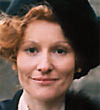
 Meg Wynn Owen - Hazel Bellamy. Originally Hazel Forrest and secretary to Major James Bellamy's father Richard, she married the major after she comforted him over his mother's death on the Titanic. Meg as since worked consistently in television and film. Recent film roles include character parts in Gosford Park, Love Actually and Pride and Prejudice. Most recently, Meg is playing the mother in the British sitcom Family Business.
Meg Wynn Owen - Hazel Bellamy. Originally Hazel Forrest and secretary to Major James Bellamy's father Richard, she married the major after she comforted him over his mother's death on the Titanic. Meg as since worked consistently in television and film. Recent film roles include character parts in Gosford Park, Love Actually and Pride and Prejudice. Most recently, Meg is playing the mother in the British sitcom Family Business.
 Leslie-Ann Down - The undisputed beauty of the series, she played orphaned Georgina Worsley. Memorably, Miss Worsley accidentally killed a working class man after borrowing the family car and driving down to the country while swilling champagne. The London-born star appeared in films The Pink Panther Strikes Again, A Little Night Music and Hanover Street opposite Harrison Ford and played Stephanie Rogers in Dallas in the early Nineties. Now iving in Los Angeles, she has played Jacqueline Payne Marone in the soap The Bold and the Beautiful since March 2003.
Leslie-Ann Down - The undisputed beauty of the series, she played orphaned Georgina Worsley. Memorably, Miss Worsley accidentally killed a working class man after borrowing the family car and driving down to the country while swilling champagne. The London-born star appeared in films The Pink Panther Strikes Again, A Little Night Music and Hanover Street opposite Harrison Ford and played Stephanie Rogers in Dallas in the early Nineties. Now iving in Los Angeles, she has played Jacqueline Payne Marone in the soap The Bold and the Beautiful since March 2003. 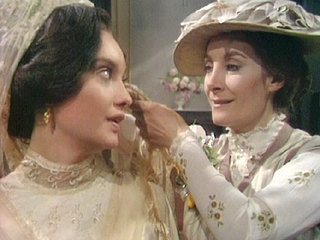 Nicola Pagett - Lady Elizabeth Kirbridge - Poor Elizabeth, she had no luck at all with men and finally moved to America to seek happiness. After leaving the series, Pagett went on to played the title role in a 1977 BBC adaptation of Anna Karenina, and she gave a memorable performance in David Nobbs's TV series 'A Bit of a Do'. She was in a variety of films including The Viking Queen and Oliver's Story. Pagett also played a lead role in the 1994 to 1995 sitcom Ain't Misbehavin'.Nicola Pagett has suffered from manic depression, and chronicled her experiences with this in a 1998 book titled Diamonds Behind My Eyes. In 1995, while appearing in What The Butler Saw at the National Theatre, she began behaving erratically and was ultimately diagnosed as having acute manic depression. During this time she developed an obsession with Alastair Campbell, who used this obsession to distract attention from negative headlines about the New Labour Party Conference. She was later escorted from her home by four men to be confined in a closed psychiatric unit, but has since been able to control her illness with medication and self-awareness.
Nicola Pagett - Lady Elizabeth Kirbridge - Poor Elizabeth, she had no luck at all with men and finally moved to America to seek happiness. After leaving the series, Pagett went on to played the title role in a 1977 BBC adaptation of Anna Karenina, and she gave a memorable performance in David Nobbs's TV series 'A Bit of a Do'. She was in a variety of films including The Viking Queen and Oliver's Story. Pagett also played a lead role in the 1994 to 1995 sitcom Ain't Misbehavin'.Nicola Pagett has suffered from manic depression, and chronicled her experiences with this in a 1998 book titled Diamonds Behind My Eyes. In 1995, while appearing in What The Butler Saw at the National Theatre, she began behaving erratically and was ultimately diagnosed as having acute manic depression. During this time she developed an obsession with Alastair Campbell, who used this obsession to distract attention from negative headlines about the New Labour Party Conference. She was later escorted from her home by four men to be confined in a closed psychiatric unit, but has since been able to control her illness with medication and self-awareness.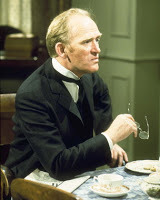 Gordon Jackson - Angus Hudson - The stern, bible quoting Mr. Hudson ran 165 Eaton Place with an iron hand, while at times his soft side was hard to conceal, as when he offered to marry Mrs. Bridges after she'd stolen a baby. Jackson was an accomplished actor who appered in several films including
Gordon Jackson - Angus Hudson - The stern, bible quoting Mr. Hudson ran 165 Eaton Place with an iron hand, while at times his soft side was hard to conceal, as when he offered to marry Mrs. Bridges after she'd stolen a baby. Jackson was an accomplished actor who appered in several films including "Mutiny on the Bounty"(1962), "The Great Escape"(1963), "The Ipcress File"(1965)and "The Prime of Miss Jean Brodie"(1969) before joining the series. Afterwards, he went in to star in the series "The Professionals." Jackson died in 1990 at age 66. You can watch the news item about his passing here.
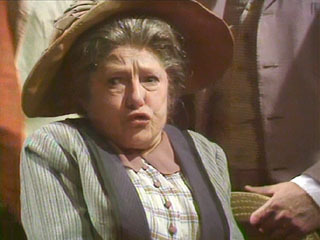 Angela Baddeley - Mrs. Bridges - Older sister to the actress Hermoine Baddeley, Angela made her stage debut at the age of 8 in 1912 at the Dalston Palace in London in a play called The Dawn of Happiness. She had a long career, but will always be remembered best as Mrs. Bridges, the cook at 165 Eaton Place ("Oh Ruby!") Following the suicide of Emily, her first kitchen hand, Mrs. Bridges had a breakdown and kidnapped a child but with the help of the Bellamy's she managed to escape punishment for it. In the series finale she married Mr Hudson after hints of a romance between the pair for years. Baddeley was set to reprise the role of Mrs Bridges in a spin-off from Upstairs, Downstairs which would have focused on Mr Hudson, Ruby and her running a boarding house by the sea. However, in February of 1976 she died in London of pneumonia at the age of 71. Her last role was on the London stage in the second cast of Stephen Sondheim's A Little Night Music. You can watch an interview with the actress here.
Angela Baddeley - Mrs. Bridges - Older sister to the actress Hermoine Baddeley, Angela made her stage debut at the age of 8 in 1912 at the Dalston Palace in London in a play called The Dawn of Happiness. She had a long career, but will always be remembered best as Mrs. Bridges, the cook at 165 Eaton Place ("Oh Ruby!") Following the suicide of Emily, her first kitchen hand, Mrs. Bridges had a breakdown and kidnapped a child but with the help of the Bellamy's she managed to escape punishment for it. In the series finale she married Mr Hudson after hints of a romance between the pair for years. Baddeley was set to reprise the role of Mrs Bridges in a spin-off from Upstairs, Downstairs which would have focused on Mr Hudson, Ruby and her running a boarding house by the sea. However, in February of 1976 she died in London of pneumonia at the age of 71. Her last role was on the London stage in the second cast of Stephen Sondheim's A Little Night Music. You can watch an interview with the actress here. 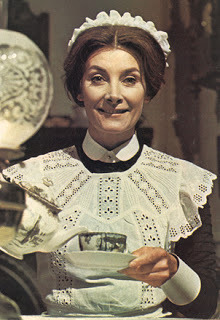 Jean Marsh - The co-creator of the series (with fellow actress Eileen Atkins), she played formidable parlourmaid Rose Buck. Marsh and Atkins also co-created the hit series House of Eliott. In the original series, Rose was always there as a shoulder to cry on for the rest of the staff, or as someone in whom to confide secrets, as Sarah did regarding her affair with James. Rose herself found no luck in love - her finace Gregory died on the battlefield and she lost all the money he left her in his will to James's investments in the stock market. Since the series ended, Marsh has maintained a very busy career in the theatre and on TV- including a starring role in the US sitcom "9 to 5" (1982) and films such as "Return to Oz" (1985) and "Willow" (1988).
Jean Marsh - The co-creator of the series (with fellow actress Eileen Atkins), she played formidable parlourmaid Rose Buck. Marsh and Atkins also co-created the hit series House of Eliott. In the original series, Rose was always there as a shoulder to cry on for the rest of the staff, or as someone in whom to confide secrets, as Sarah did regarding her affair with James. Rose herself found no luck in love - her finace Gregory died on the battlefield and she lost all the money he left her in his will to James's investments in the stock market. Since the series ended, Marsh has maintained a very busy career in the theatre and on TV- including a starring role in the US sitcom "9 to 5" (1982) and films such as "Return to Oz" (1985) and "Willow" (1988). 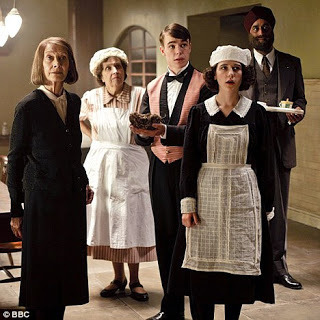
Marsh will again play Rose in the new version of U/D, but this time her position in the household will be housekeeper. Marsh can be seen on the left in this photo.
 Christopher Beeney played Edward Barnes the footman, who later went on to marry housemaid Daisy Peel. When Edward returned from the Great War he was depicted as suffering from shell shock. Beeney was a regular on the UK's first soap opera The Grove Family. He went on to star in the comedy In Loving Memory. In recent years has cameoed on Last of the Summer Wine.
Christopher Beeney played Edward Barnes the footman, who later went on to marry housemaid Daisy Peel. When Edward returned from the Great War he was depicted as suffering from shell shock. Beeney was a regular on the UK's first soap opera The Grove Family. He went on to star in the comedy In Loving Memory. In recent years has cameoed on Last of the Summer Wine. 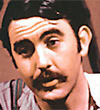
 John Alderton played Thomas Watkins the moustachioed chauffeur, a character Alderton himself described as "a conniving, thieving, chauvinistic baddie." The series also featured his wife Pauline Collins. They went on to star together in the spin-off drama Thomas and Sarah. Before playing Watkins, he starred in the classic sitcom Please, Sir! and later appeared in the sitcom No Honestly and Wodehouse Playhouse. Alderton has also made appearances in James Herriot's 1975 film It Shouldn't Happen To A Vet and in the 2003 movie Calendar Girls. Most recently, Alderton played Christopher Casby in the 2008 BBC adaptation of the Dickens classic Little Dorrit.
John Alderton played Thomas Watkins the moustachioed chauffeur, a character Alderton himself described as "a conniving, thieving, chauvinistic baddie." The series also featured his wife Pauline Collins. They went on to star together in the spin-off drama Thomas and Sarah. Before playing Watkins, he starred in the classic sitcom Please, Sir! and later appeared in the sitcom No Honestly and Wodehouse Playhouse. Alderton has also made appearances in James Herriot's 1975 film It Shouldn't Happen To A Vet and in the 2003 movie Calendar Girls. Most recently, Alderton played Christopher Casby in the 2008 BBC adaptation of the Dickens classic Little Dorrit. 
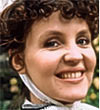 Pauline Collins - The real life wife of John Alderton, Collins played maid Sarah Moffat, who became pregnant by Major James Bellamy before beginning a relationship with the chauffeur Thomas. Best known for Bafta-winning title role in 1989 film Shirley Valentine. After Shirley Valentine, Collins again starred alongside her husband in the popular ITV drama series
Forever Green
in which the couple escape the city with their children to start a new life in the country. It ran from 1989 to 1992 over 18 episodes. In 2005, she starred alongside Gillian Anderson in BBC's version of Bleak House, playing Miss Fite. Collins was awarded an OBE in 2001.
Pauline Collins - The real life wife of John Alderton, Collins played maid Sarah Moffat, who became pregnant by Major James Bellamy before beginning a relationship with the chauffeur Thomas. Best known for Bafta-winning title role in 1989 film Shirley Valentine. After Shirley Valentine, Collins again starred alongside her husband in the popular ITV drama series
Forever Green
in which the couple escape the city with their children to start a new life in the country. It ran from 1989 to 1992 over 18 episodes. In 2005, she starred alongside Gillian Anderson in BBC's version of Bleak House, playing Miss Fite. Collins was awarded an OBE in 2001. 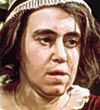 Jenny Tomasin played dim-witted and downtrodden scullery maid Ruby Finch, replacing Emily, a maid who committed suicide. After Upstairs, Downstairs ended, Tomasin joined the cast of Midland based soap Crossroads playing waitress Florence Baker, who was close friends with the infamous Benny Hawkins. The actress remained with the Motel soap until 1979. In the 1980s she made a memorable appearance in Doctor Who during Colin Baker's tenure as the Doctor. Her character, Tasambeker, was exterminated by the Daleks. More recently Tomasin appeared in ITV soap Emmerdale before her character, Noreen Bell, was killed off.
Jenny Tomasin played dim-witted and downtrodden scullery maid Ruby Finch, replacing Emily, a maid who committed suicide. After Upstairs, Downstairs ended, Tomasin joined the cast of Midland based soap Crossroads playing waitress Florence Baker, who was close friends with the infamous Benny Hawkins. The actress remained with the Motel soap until 1979. In the 1980s she made a memorable appearance in Doctor Who during Colin Baker's tenure as the Doctor. Her character, Tasambeker, was exterminated by the Daleks. More recently Tomasin appeared in ITV soap Emmerdale before her character, Noreen Bell, was killed off. You can watch most of the surviving cast members discussing the series and their roles in The Making of Upstairs, Downstairs beginning here.
Published on December 24, 2010 01:19
December 23, 2010
What Christmas Is In Country Places by Charles Dickens
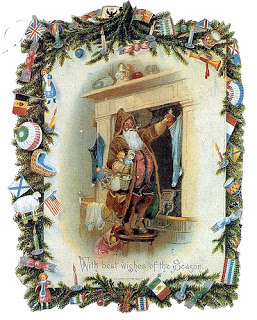
If we want to see the good old Christmas— the traditional Christmas—of old England, we must look for it in the country. There are lasting reasons why the keeping of Christmas cannot change in the country as it may in towns. The seasons themselves ordain the festival. The close of the year is an interval of leisure in agricultural regions ; the only interval of complete leisure in the year; and all influences and opportunities concur to make it a season of holiday and festivity. If the weather is what it ought to be at that time, the autumn crops are in the ground; and the springing wheat is safely covered up with snow. Everything is done for the soil that can be done at present; and as for the clearing and trimming and repairing, all that can be looked to in the after part of the winter; and the planting is safe if done before Candlemas. The plashing of hedges, and cleaning of ditches, and trimming of lanes, and mending of roads, can be got through between Twelfth Night and the early spring ploughing; and a fortnight may well be given to jollity, and complete change.
Such a holiday requires a good deal of preparation: so Christmas is, in this way also, a more weighty affair in the rural districts than elsewhere. The strong beer must be brewed. The pigs must be killed weeks before; the lard is wanted; the bacon has to be cured; the hams will be in request; and, if brawn is sent to the towns, it must be ready before the children come home for the holidays. Then, there is the fattening of the turkeys and geese to be attended to; a score or two of them to be sent to London, and perhaps half-a-dozen to be enjoyed at home. When the gentleman,or the farmer,or the country shop-keeper, goes to the great town for his happy boys and girls, he has a good deal of shopping to do. Besides carrying a note to the haberdasher, and ordering coffee, tea, dried fruit, and spices, he must remember not to forget the packs of cards that will be wanted for loo and whist. Perhaps he carries a secret order for fiddlestrings from a neighbour who is practising his part in good time.
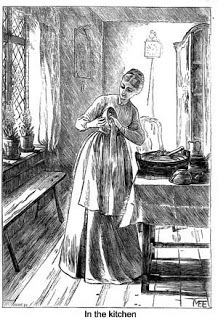
There is one order of persons in the country to whom the month of December is anything but a holiday season—the cooks. Don't tell us of town-cooks in the same breath! It is really overpowering to the mind to think what the country cooks have to attend to. The goose-pie, alone, is an achievement to be complacent about; even the most ordinary goose-pie ; still more, a superior one, with a whole goose in the middle, and another cut up and laid round ; with a fowl or two, and a pheasant or two, and a few larks put into odd corners; and the top, all shiny with white of egg, figured over with leaves of pastry, and tendrils and crinkle-crankles, with a bunch of the more delicate bird feet standing up in the middle. The oven is the cook's child and slave; the great concern of her life, at this season. She pets it, she humours it, she scolds it, and she works it without rest. Before daylight she is at it—baking her oat bread; that bread which requires such perfect behaviour on the part of the oven! Long lines of oat-cakes hang overhead, to grow crisp before breakfast; and these are to be put away when crisp, to make room for others; for she can hardly make too much. After breakfast, and all day, she is making and baking meat-pies, mince-pies, sausage-rolls, fruit-pies, and cakes of all shapes, sizes, and colours.
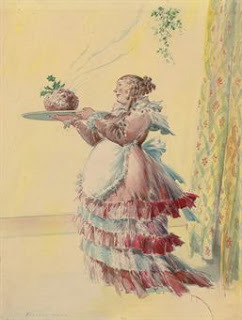
And at night, when she can scarcely stand for fatigue, she banks the oven fire, and puts in the great jar of stock for the soups, that the drawing may go on, from all sorts of savoury odds and ends, while everything but the drowsy fire is asleep. She wishes the dear little lasses would not come messing and fussing about, making gingerbread and cheesecakes. She would rather do it herself, than have them in her way. But she has not the heart to tell them so. On the contrary, she gives them ginger, and cuts the citron-peel bountifully for them; hoping, the while, that the weather will be fine enough for them to go into the woods with their brothers for holly and ivy. Meantime, the dairy-woman says, (what she declares every Christmas,) that she never saw such a demand for cream and butter; and that, before Twelfth Night, there will be none. And how, at that season, can she supply eggs by scores, as she is expected to do. The gingerbread baked, the rosiest apples picked out from their straw in the apple-closet, the cats, and dogs, and canary birds, played with and fed, the little lasses run out to see what the boys are about.
The woodmen want something else than green to dress the house with. They are looking for the thickest, and hardest, and knottiest block of wood they can find, that will go into the kitchen chimney. A gnarled stump of elm will serve their purpose best; and they trim it into a size to send home. They fancy that their holiday is to last as long as this log remains; and they are satisfied that it will be uncommonly difficult to burn up this one. This done, one of them proceeds with the boys and girls to the copses where the hollies are thickest; and by carrying his bill-hook, he saves a vast deal of destruction by rending and tearing. The poor little birds, which make the hollies so many aviaries in winter, coming to feed on the berries, and to pop in among the shining leaves for shelter, are sadly scared, and out they flit on all sides, and away to the great oak, where nobody will follow them.
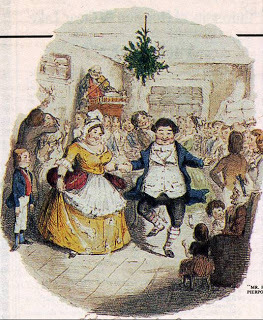
For, alas! there is no real mistletoe now. There is to be something so called hung from the middle of the kitchen ceiling, that the lads and lasses may snatch kisses and have their fun; but it will have no white berries, and no Druidical dignity about it. It will be merely a bush of evergreen, called by some a mistletoe, and by others the Bob, which is supposed to be a corruption of " bough." When all the party have got their fagots tied up, and strung over their shoulders, and button-holes, hats, and bonnets stuck with sprigs, and gay with berries, it is time they were going home ; for there is a vast deal to be done this Christmas Eve, and the sunshine is already between the hills, in soft yellow gushes, and not on them.
A vast deal there is to be done; and especially if there is any village near. First, there is to dress the house with green; and then to go and help to adorn the church. The Bob must not be hung up till to-morrow: but every door has a branch over it; and the leads of the latticed windows are stuck with sprigs; and every picture-frame, and lookingglass, and candlestick is garnished. Any "scraps" (very young children) who are too small to help, pick up scattered holly-leaves, and, being not allowed to go upon the rug, beg somebody to throw them into the fire; whence ensues a series of cracklings, and sputtering blazes, and lighting up of wide-open eyes. In the midst of this—hark ! is not that the church bell? The boys go out to listen, and report that it is so;—the "Christmas deal" (or dole) is about to begin; so, off go all who are able, up to the church.
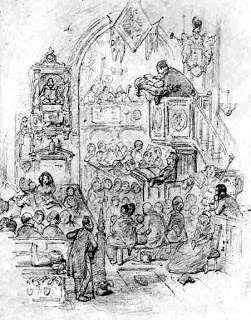
It is very cold there, and dim, and dreary, in spite of the candles, and the kindness, and other good things that are collected there. By the time the bell has ceased to clang, there are a few gentlemen there, and a number of widows, and aged men, and orphan children. There are piles of blankets; and bits of paper, which are orders for coals. One gentleman has sent a bag of silver money; and another, two or three sheep, cut up ready for cooking; and another, a great pile of loaves. The boys run and bring down a ladder to dress the pillars; and scuffle in the galleries; and venture into the pulpit, under pretence of dressing the church. When the dole is done and the poor people gone, the doors are closed; and, if the boys remain, they must be quiet; for the organist and the singers are 'going to rehearse the anthem that is to be sung to-morrow. If the boys are not quiet, they are turned out.
There is plenty of bustle in the village. The magistrates are in the long room of the inn, settling justice business. The inn looks as if it were illuminated. The waiters are seen to glide across the hall; and on the steps are the old constable, and the new rural policeman, and the tax-collector, and the postman. It is so cold that something steaming hot will soon be brought for them to drink; and the poor postman will be taken on his weak side. Christmas is a trying season to him, with his weak head, and his popularity, and his Christmas-boxes, and his constant liability to be reported.
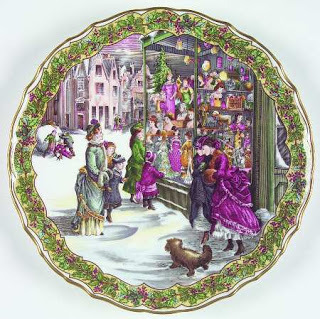
Cold as it is, there are women flitting about; going to or from the grocer's shop, and all bringing away the same things. The grocers give away, this night, to their regular customers, a good mould candle each, and a nutmeg. This is because the women must be up by candle-light to-morrow, to make something that is to be spiced with nutmeg. So a good number of women pass by with a candle and a nutmeg; and some, with a bottle or pitcher, come up the steps, and go to the bar for some rum. But the clock strikes supper-time, and away go the boys home.
Somebody wonders at supper whether the true oval mince-pie is really meant to be in the form of a certain manger; and its contents to signify the gifts, various and rich, brought by the Magi to that manger. And while the little ones are staring at this news, somebody else observes that it was a pretty idea of the old pagans, in our island, of dressing up their houses with evergreens, that there might be a warm retreat for the spirits of the woods in times of frost and bitter winter storms. Some child peeps timidly up at the biggest branch in the room, and fancies what it would be to see some sprite sitting under a leaf, or dancing along a spray. When supper is done, and the youngest are gone to bed, having been told not to be surprised if they should hear the stars singing in the night, the rest of the party turn to the fire, and begin to roast their chestnuts in the shovel, and to heat the elderwine in the old-fashioned saucepan, silvered inside. One absent boy, staring at the fire, starts when his father offers him a chestnut for his thoughts. He hesitates, but his curiosity is vivid, and he braves all the consequences of saying what he is thinking about. He wonders whether he might, just for once, —just for this once—go to the stalls when midnight has struck, and see whether the oxen are kneeling. He has heard, and perhaps read, that the oxen kneeled, on the first Christmas-day, and kept the manger warm with their breath ; and that all oxen still kneel in their stalls when Christmas-day comes in. Father and mother exchange a quick glance of agreement to take this seriously; and they explain that there is now so much uncertainty, since the New Style of reckoning the days of the year was introduced, that the oxen cannot be depended on; and it is not worth while to be out of bed at midnight for the chance. Some say the oxen kneel punctually when Old Christmas comes in; and if so, they will not do it to-night.
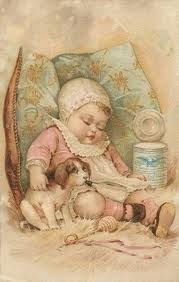
This is not the quietest night of the year; even if nobody visits the oxen. Soon after all are settled to sleep, sounds arise which thrill through some who are half-awakened by them, and then, remembering something about the stars singing, the children rouse themselves, and lie, with open eyes and ears, feeling that Christmas morning has come. They must soon, one would think, give up the star theory; for the music is only two fiddles, or a fiddle and clarionet; or, possibly, a fiddle and drum, with a voice or two, which can hardly be likened to that of the spheres. The voices sing, " While shepherds watch'd their flocks by night ;" and then—marvellously enough.—single out this family of all the families on the earth, to bless with the good wishes of the season. They certainly are wishing to master and mistress and all the young ladies and gentlemen, "good morning," and " a merry Christmas and a happy New Year." Before this celestial mystery is solved, and before the distant twang of the fiddle is quite out of hearing, the celestial mystery of sleep enwraps the other, and lays it to rest until the morrow.
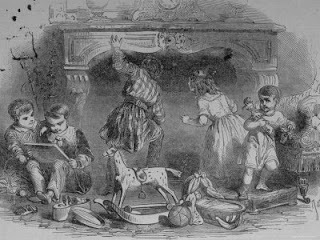
The boys—the elder ones—meant to keep awake; first, for the Waits, and afterwards to determine for themselves whether the cock crows all night on Christmas Eve, to keep all hurtful things from walking the earth. When the Waits are gone, they just remember that any night, between this and Old Christmas, will do for the cock, which is said to defy evil spirits in this manner for the whole of that season. Which the boys are very glad to remember; for they are excessively sleepy; so off they go into the land of dreams.
It is now past two; and at three the maids must be up. Christmas morning is the one, of all the year, when, in the North of England especially, families make a point of meeting, and it must be at the breakfast table. In every house, far and near, where there is fuel and flour, and a few pence to buy currants, there are cakes making, which everybody must eat of; cakes of pastry, with currants between the layers. The grocer has given the nutmeg; and those who can afford it, add rum, and other dainties. The ladies are up betimes, to set out the best candlesticks, to garnish the table, to make the coffee, and to prepare a welcome for all who claim a seat. The infant in arms must be there, as seven o'clock strikes. Any married brother or sister, living within reach, must be there, with the whole family train. Long before sunrise, there they sit, in the glow of the fire and the glitter of candles, chatting and laughing, and exchanging good wishes.
In due time, the church-bell calls the flock of worshippers from over hill, and down dale, and along commons, and across fields: and presently they are seen coming, all in their best,—the majority probably saying the same thing,—that, somehow, it seems always to be fine on Christmas-day. Then, one may reckon up the exceptions he remembers; and another may tell of different sorts of fine weather that he has known; how, on one occasion, his daughter gathered thirty-four sorts of flowers in their own garden on Christmas-day; and the rose-bushes had not lost their leaves on Twelfth Day; and then the wise will agree how much they prefer a good seasonable frost and sheeted snow like this, to April weather in December.
Service over, the bell silent, and the sexton turning the key in the lock, off run the young men, out of reach of remonstrance, to shoot, until dinner at least,—more probably until the light fails. They shoot almost any thing that comes across them, but especially little birds,— chaffinches, blackbirds, thrushes,—any winged creature distressed by the cold, or betrayed by the smooth and cruel snow. The little children at home are doing better than their elder brothers. They are putting out crums of bread for the robins, and feeling sorry and surprised that robins prefer bread to plumpudding. They would have given the robins some of their own pudding, if they had but liked it.
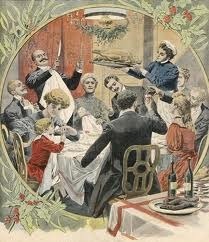
In every house, there is dinner to-day,—of one sort or another,—except where the closed shutter shows that the folk are out to dinner. The commonest dinner in the poorer houses —in some parts of the country—is a curious sort of mutton pie. The meat is cut off a loin of mutton, and reduced to mouthfuls, and then strewed over with currants or raisins and spice, and the whole covered in with a stout crust. In some places, the dinner is baked meat and potatoes: in too many cottages, there is nothing better than a morsel of bacon to flavour the bread or potatoes. But it may be safely said that there is more and better dining in England on Christmas-day than on any other day of the year.
In the houses of gentry and farmers, the dinner and dessert are a long affair, and soon followed by tea, that the sports may begin. Everybody knows what these sports are, in parlour, hall, and kitchen :—singing, dancing, cards, blind-man's buff, and other such games; forfeits, ghost-story telling, snap-dragon;— these, with a bountiful supper interposed, lasting till midnight. In scattered houses, among the wilds, card-playing goes on briskly. Wherever there are Wesleyans enough to form a congregation, they are collected at a tea-drinking in their chapel; and they spend the evening in singing hymns. Where there are Germans settled, or any leading family which has been in Germany, there is a Christmastree lighted up somewhere. Those Christmastrees are as prolific as the inexhaustible cedars of Lebanon. Wherever one strikes root, a great number is sure to spring up under its shelter.
However spent, the evening comes to an end. The hymns in the chapel, and the carols in the kitchen, and the piano in the parlour are all hushed. The ghosts have glided by into the night. The forfeits are redeemed. The blind-man has recovered his sight, and lost it again in sleep. The dust of the dancers has subsided. The fires are nearly out, and the candles quite so. The reflection that the great day is over, would have been too much for some little hearts, sighing before they slept, but for the thought that to-morrow is Boxing Day; and that Twelfth Night is yet to come.
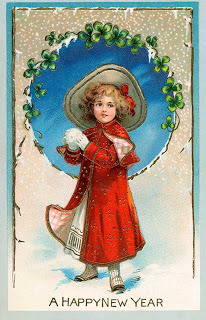
But, first, will come New Year's Eve, with its singular inconvenience (in some districts) of nothing whatever being carried out of the house for twenty-four hours, lest, in throwing away anything, you should be throwing away some luck for the next year. Not a potatoparing, nor a drop of soap-suds or cabbagewater, not a cinder, nor a pinch of dust, must be removed till New Year's morning. In these places, there is one person who must be stirring early—the darkest man in the neighbourhood. It is a serious thing there to have a swarthy complexion and black hair; for the owner cannot refuse to his acquaintance the good luck of his being the first to enter their houses on New Year's day. If he is poor, or his time is precious, he is regularly paid for his visit. He comes at daybreak, with something in his hand, if it is only an orange or an egg, or a bit of ribbon, or a twopenny picture. He can't stay a minute,—he has so many to visit; but he leaves peace of mind behind him. His friends begin the year with the advantage of having seen a dark man enter their house the first in the New Year.
Such, in its general features, is Christmas, throughout the rural districts of Old England. Here, the revellers may be living in the midst of pastoral levels, all sheeted with snow; there, in deep lanes, or round a village green, with ploughed slopes rising on either hand: here, on the spurs of mountains, with glittering icicles hanging from the grey precipices above them, and the accustomed waterfall bound in silence by the frost beside their doors; and there again, they may be within hearing of the wintry surge, booming along the rocky shore; but the revelry is of much the same character everywhere. There may be one old superstition in one place, and another in another ; but that which is no superstition is everywhere;—the hospitality, the mirth, the social glow which spreads from heart to heart, which thaws the pride and the purse-strings, and brightens the eyes and affections.
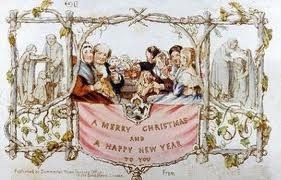
Merry Christmas!
Published on December 23, 2010 01:52
December 22, 2010
Staying at the Palace - Maybe
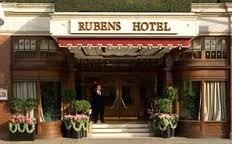
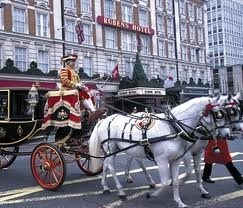
I wrote the post below a few weeks ago, when our trip to London looked certain. However, it's now December 21st and I truly doubt we'll be able to make it. We're scheduled to fly into Heathrow. Go ahead, laugh. Done? Okay then, we're flying to NJ on Thursday to spend Xmas with my mom and daughter and are supposed to then fly to London on Saturday night. As you may have heard, Heathrow is a refugee camp just now, flights both in and out are in the main cancelled and weekend flights look doubtful. More snow is predicted today for London. Sigh. Seeing as how Gatwick Airport is still running smoothly, I've been online to see if I could possibly book flights into that airport instead. The only flights from the NY metropolitan area that fly into Gatwick are connecting flights, with the least airtime being 11 hours. Sigh. So, I'm going to go to NJ and can only play it by ear from then on, checking with the airline and hoping (against hope) that we can make it out. If so, it looks as though it will truly be a Christmas miracle. Keep your fingers crossed for us, say a prayer and read the post below in the hopes that we actually see London.
Keeping my fingers crossed that neither snow or terrorists prevent our landing, my husband, Greg, and I fly out on the night of the 25th to London and will be staying at the Rubens at the Palace Hotel, whose entrance directly faces the gates to the Royal Mews. I suppose staying at a hotel within spitting distance of the palace has a certain cache, but in earlier times the area was not one to boast about.
We find the following overview of the area in London Illustrated with Bird's Eye Views of the Principal Streets: "In Buckingham Palace Road we are in Pimlico, once noted for its Gardens for public entertainment, of which the chief was known as ' Jenny's Whim.' The District Post-office, and Buckingham Palace Hotel, one of the largest hotels in London, face the garden wall of Buckingham Palace. Farther west Arabella Bow turns off a little to the north, and the road is continued past Grosvenor Place to Hyde Park Corner. If, however, we pursue our way through Buckingham Palace Road but a little farther, we shall cross a main thoroughfare, the left or eastern side of which almost immediately becomes Victoria Street, Westminster—a, modern street of mansions divided into suites of chambers or flats, which has been recently constructed upon the site of Old Tothill Fields. The Tothill Fields Prison, built in 1834 upon the site of a Bridewell, said to have been erected in 1618, was demolished in 1884. It was of late used for women exclusively."
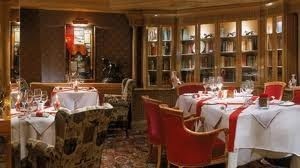 The Library Restaurant
The Library RestaurantThe Rubens Hotel was purpose built in 1911/12 to house debutantes making their first court appearances at Buckingham Palace and in 1985, thirteen people were arrested in connection with a suspected IRA mainland bombing campaign uncovered by police when a bomb was discovered in the Rubens Hotel, where civil dignitaries and mayors were expected to stay for three Buckingham Palace garden parties.
I've stayed at the Rubens before, when I was acting as tour guide during a Novel Explorations Tour. It's marvelously English - uniformed male staff complete with top hats and gloves, a tuxedo clad pianist in the lounge in the evenings, afternoon teas and beef carved to order. Did I mention the full English breakfasts? And just a few streets away is Eaton Place, where Upstairs, Downstairs was set. You can bet I'll be taking a stroll over there in order to take a snap for a future blog. Lucky for me, the new Upstairs, Downstairs series will be airing in the UK whilst I'm there and I'm hoping to be able to see at least one episode without having to wait until April, when it's set to air in the States.
I'll also be looking for fabulous prizes for future contests on this blog. And I'll be showing my husband England - he's never been, whilst I've been twice since meeting him four years ago. I'm a tad nervous, as it's important that he comes to love London, and England, as much as I do. He's already seriously agreed that we'll get a place across the pond one day. He is not interested in British history at all. The only thing he knows about the Duke of Wellington is that he has to walk past his portraits a few times a day. He does like watching Foyle's War, so perhaps there's hope. And there's the fact that my daughter, Brooke, who is also not into history, loves London. And England in general.
So I plan on doing all the rounds of tourist attractions with Greg - the Hop On, Hop Off double decker bus tour, the Tower, Madame Tussaud's, Horse Guards to see the Guards mount up for the changing, Ronnie Scott's jazz club, etc., etc. I've also got a few London Walks on the agenda (if it's not absolutely freezing), as well as day trips to Bath and Leeds Castle. I mean, everyone's got to see a real castle when in England, no? Of course, all of some of these outdoor plans may change depending on the weather and the threat of frostbite. There are a few things on the itinerary for me - Cecil Court, Hatchard's, the antiques market at St. James's Churchyard on the Tuesday, the Thomas Lawrence exhibit at the National Portrait Gallery and . . . . Apsley House, my place of pilgrimage whenever in London. Brooke actually groaned when I told her I was going to take Greg there, "You're kidding me, right?" Wrong. Oh, and I suppose I'll point out to Greg the spot where Brooke is going to scatter our ashes after he and I turn up our toes. I'm confident they will be scattered there because I'm leaving Brooke money in my will in order to travel to London specifically for that purpose. And Brooke will do almost anything for a trip to London.
We fly out to New Jersey on the 23rd in order to spend Xmas with Brooke and my Mom, then Greg and I fly to London on the night of the 25th. With snow predicted for London at Xmas, I'm packing my warmest clothes and I'll be bringing my laptop and hope to be able to log on from time to time during our visit - stay tuned for a few "blog postcards" in the near future.
Published on December 22, 2010 01:29
December 21, 2010
Meet Albert Nobbs

Glenn Close is set to appear on the big screen as the gendre switching title character Albert Nobbs in a new film currently in production. Close starred in an off-Broadway adaptation of George Moore's short story in 1982 as the title character, a woman who lives as a man in the Victorian era in order to take advantage of the luxuries and opportunities not otherwise afforded to women at that time. Close is starring as Albert Nobbs this time around too; she also co-wrote the screenplay and is producing the Rodrigo García-directed film.
Set around a luxury hotel in Dublin in the 19th century, this is the story of a woman must pretend to be a man in order to survive in 19th century Ireland. The film began shooting in June in Dublin with a cast that includes Michael Gambon, Janet McTeer, Jonathan Rhys Meyers and Orlando Bloom. The story finds Close's heroine trapped in a prison of her own making after spending 20 years dressing and working as a man. Close won an Obie Award in 1983 playing the same character in Simone Benmussa's Off Broadway interpretation of "The Singular Life of Albert Nobbs."

Actress Amanda Seyfried has come on board to play Close's love interest and recently told and interviewer, "[Close] cast me in it to play her love interest ... and it's f*cking amazing. It's a really amazing script! It's crazy. It's a version of myself, but with an accent, so it's going to be really challenging in a very technical way, but I'm so excited to talk about that. That's confirmed!"
Published on December 21, 2010 01:14
December 19, 2010
Victoria's Family Christmas
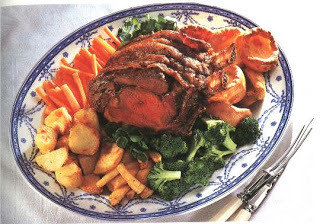 That would be Victoria H. not Victoria R. -- you've already heard about her Christmas.
That would be Victoria H. not Victoria R. -- you've already heard about her Christmas.My family always had an English Christmas dinner, complete with Roast Beef, Yorkshire Pudding and for dessert, Plum Pudding made by my grandmother, known as Mimi, from a recipe suposedly brought to the U.S. by her grandmother (my great-great grandmother) Elizabeth Stanley about 1850.
 Elizabeth and Thomas Stanley came by ship from Liverpool to New Orleans and up the Mississippi to St. Louis. They traveled east across Illinois almost to the border with Indiana, the Wabash River.
Elizabeth and Thomas Stanley came by ship from Liverpool to New Orleans and up the Mississippi to St. Louis. They traveled east across Illinois almost to the border with Indiana, the Wabash River.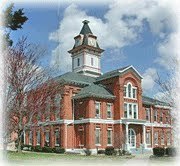 There, in the little town of Albion, Illinois, they settled. They had come from their home in Yorkshire with eight children including a pair of 2-yr.-old twins. I can't begin to imagine what they endured. A final son was born to them in 1852, named George Washington Stanley, my great-grandfther. He became the sheriff of Edwards County, IL, of which Albion was the seat. So Mimi (1890-1975) spent a part of her childhood in a house on Court House Square which also held the office and jail as well as the residence of the county's leading law enforcer.
There, in the little town of Albion, Illinois, they settled. They had come from their home in Yorkshire with eight children including a pair of 2-yr.-old twins. I can't begin to imagine what they endured. A final son was born to them in 1852, named George Washington Stanley, my great-grandfther. He became the sheriff of Edwards County, IL, of which Albion was the seat. So Mimi (1890-1975) spent a part of her childhood in a house on Court House Square which also held the office and jail as well as the residence of the county's leading law enforcer.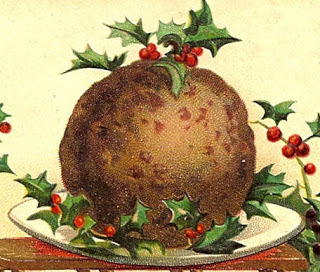 Some weeks before Christmas, Mimi chose a piece of flour sacking which she boiled until it was absolutely sterile. Once the batter and fruits were mixed, they were piled onto the cloth, then it was gathered up and tied at the top and steamed in a large boiler, the kind of copper boilers they did laundry in.
Some weeks before Christmas, Mimi chose a piece of flour sacking which she boiled until it was absolutely sterile. Once the batter and fruits were mixed, they were piled onto the cloth, then it was gathered up and tied at the top and steamed in a large boiler, the kind of copper boilers they did laundry in.

This hanging pudding-filled cloth on a broomstick over the boiling water steamed the pudding into a round shape. One of the crucial moments was after the puddding had cooled -- peeling the cloth off without tearing the "skin" of the pudding. Many laments often accompanied this operation, but it had nothing to do with the taste of the pudding.
 What does affect the taste of the pudding (besides the ingredients) are the sauces -- my Grandmother always served two, one warm, one room temperature -- and the ceremonial flaming with warmed brandy in a darkened dining room, at which moment everyone oohed and aahed and Mimi said, "Well, it isn't as good as last year's." We all disagreed, to her pleasure, year after year. If you try it, warm the brandy before pouring it over the pudding. If it is not warmed a bit, it won't have the lovely blue flame you want.
What does affect the taste of the pudding (besides the ingredients) are the sauces -- my Grandmother always served two, one warm, one room temperature -- and the ceremonial flaming with warmed brandy in a darkened dining room, at which moment everyone oohed and aahed and Mimi said, "Well, it isn't as good as last year's." We all disagreed, to her pleasure, year after year. If you try it, warm the brandy before pouring it over the pudding. If it is not warmed a bit, it won't have the lovely blue flame you want.
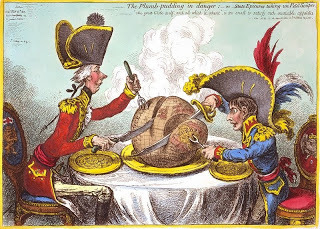 Plum pudding is a traditional dish and a traditional symbol of Britain. Here is a cartoon by James Gillray from 1805 called the Plum-pudding in Danger -- showing the English possessing the sea while the French carve off Europe.Here is my Grandmother's recipe, accompanied by the two sauces.
Plum pudding is a traditional dish and a traditional symbol of Britain. Here is a cartoon by James Gillray from 1805 called the Plum-pudding in Danger -- showing the English possessing the sea while the French carve off Europe.Here is my Grandmother's recipe, accompanied by the two sauces.Mimi's Old English Plum Pudding
4 C. flour
1 C. butter or 3 scant C. suet, finely chopped
1 box currants, washed and dried well
1 box seedless raisins
1 box golden raisins
Optional: other dried fruits and nuts, such as candied orange or lemon peel, dried apricots, cherries, dates, chopped almonds, etc.
2 C. granulated sugar or brown sugar or one C. each
1 t. cinnamon
1 t ground ginger
Sprinkle of nutmeg
½ t. cloves (optional)
3-4 eggs
1 t baking soda
Milk by the spoonful
Sift flour, sugar and spices into large bowl. Add butter or suet, currants and raisins, and other fruits and nuts, as desired. Beat eggs and add to dry mixture, stirring well.
Add baking soda dissolved in a little hot water. Mix and stir to a stiff batter with milk. The mixture should be stiff enough that a wooden spoon will stand up in the batter.
Dip a pudding cloth (cotton flour sacking) in hot water, then dredge with flour. Add pudding mix and bring edges of cloth together and tie loosely (not real close to the pudding at the top).
Boil four hours in large kettle, placing the pudding into boiling water to cover. For round shape, tie top of cloth to a stick across the top of the pan.
OR: put pudding into a mold and steam according to directions for steamed puddings in any cookbook.
Note: Pudding should be served hot; may be prepared several days before serving and resteamed when served.
Place on platter and stick Holly in the top. Pierce with fork in several places. Warm brandy and pour over the pudding. Light and present to table with blue flames dancing on the surface of the pudding. Serve with warm lemon sauce and/or hard sauce. Keeps well in refrigerator if wrapped in foil.
Mimi's Lemon Sauce for Plum Pudding
1 c. granulated sugar
2 T cornstarch
2 C boiling water
4 T butter
3-4 T Lemon Juice
¼ t. salt
Mix sugar and cornstarch, add water gradually, stirring constantly. Boil for 5 minutes. Remove from heat, add butter, lemon juice and salt. Serve warm over slices of plum pudding.
Mimi's Hard Sauce for Plum Pudding
1-2 C. powdered sugar
½ C. Butter
2 t. vanilla
Dash of rum or rum flavoring
Mix ingredients and beat until light and creamy. Refrigerate.
Happy Christmas!!
Published on December 19, 2010 01:15
December 18, 2010
The Wellington Connection - Christmas Trees
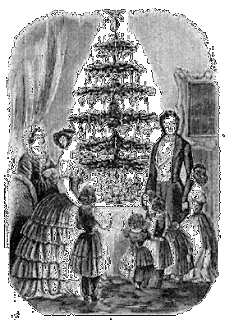
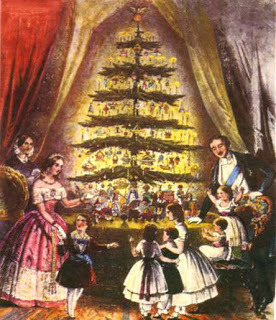
What would Christmas be without our trimming the tree? Some believe that it was Prince Albert who introduced the custom of the Christmas tree to England, while others maintain that they were introduced to England by King George III's German wife, Queen Charlotte. However, it was only circa 1848, after the London Illustrated News ran the engraving depicting showing Queen Victoria and Prince Albert celebrating around the Christmas tree with their children (above left) that this tradition caught on with the public.
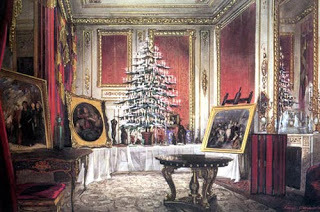
Queen Victoria's Christmas tree at Windsor in 1850 as painted by James Roberts (1824 - 1867). The presents around the tree are from Prince Albert.
We thought it might prove amusing to see what others had written about the Christmas tree in centuries past.
Amelia Murray, Recollections from 1803 to 1837
Christmas-trees are now common. In the early part of this century they were seldom seen, but Queen Charlotte always had one dressed up in the room of Madame Berkendorff, her German attendant; it was hung with presents for the children, who were invited to see it, and I well remember the pleasure it was to hunt for one's own name, which was sure to be attached to one or more of the pretty gifts.
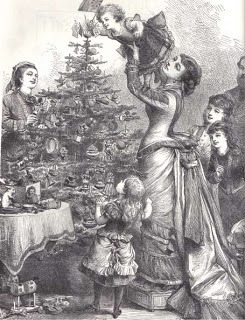
From 20 Years at Court
The Hon. Eleanor Stanley (maid of honour to Queen Victoria, 1842-1862) to her Mother, Lady Mary Stanley, Windsor Castle, Saturday, Dec. 25th, 1847.
Dearest Mama,—A merry Xmas, and many happy returns of the day to you and all the family at the dear old Castle. Yesterday evening we were desired, at a quarter to seven, to come down to the Corridor, to get our Gifts; we found all the gentlemen and Mrs. Anson already assembled, and presently the page desired us to go to the Oak-room, where the Queen and Prince already were, standing by a large table covered with a white cloth, in the middle of which was a little fir-tree, in the German fashion, covered with bonbons, gilt walnuts, and little coloured tapers. I send a bonbon as a Christmas box to little Blanche, which I took off the tree. . . . The children had each a little table with their new toys, and were running about in great glee showing them off; Prince Alfred, in a glorious tinsel helmet that almost covered his face, was shooting us all with a new gun, and Princess Alice was making us admire her dolls, etc. They had one Christmas tree among them, like us, but the Queen, Prince, and Duchess had each one, and altogether I never saw anything prettier than the whole arrangement.
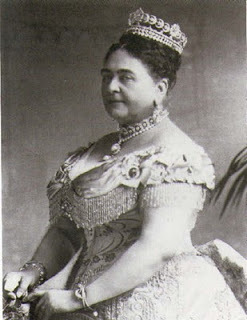 Princess Mary Adelaide, Duchess of Teck
Princess Mary Adelaide, Duchess of TeckFrom The Memoirs of Princess Mary Adelaide, Duchess of Teck
Cambridge Cottage, January 1, 1848.
My Dearest Draperchen, (her former governess, Miss Draper, whom she addressed as 'Ma chere Draperchen), . . . Our Christmas went off very well. The room was beautifully decorated ; there were four fine trees, and these were connected by wreaths of laurel evergreens and holly.
by the same author
Cambridge Cottage, January 9, 1849The Christmas holidays have been very happily spent by the inmates of Cambridge Cottage, and I have received a number of cadeaux! Our Trees were arranged in the Conservatory, which was hung with festoons of evergreens, from which transparent lamps were suspended. The whole was well lighted up, and looked remarkably pretty, and the three trees were quite covered with bon-bons and fruit.
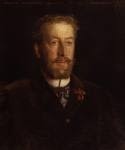 Lord Ronald Sutherland Gower
Lord Ronald Sutherland GowerMy Reminiscences By Lord Ronald Sutherland Gower
At Trentham, Christmas 1854, I find, on turning the pages of that record of my early years, much detail regarding our Christmas gifts and of the Christmas tree; now so general in English homes at Yuletide, but then hardly seen but in a few English houses. Our German tutor claimed to have introduced this pretty custom in this country in our fam'ly, the first implanted out of Germany having been erected by him in the hall at Stafford House. Until recently there was always one of these Christmas trees, richly decked, placed in one of the drawing-rooms at Trentham on Christmas Eve; and the household attended to see the illuminations and receive the gifts that were one by one cut off from the lighted boughs. No one was forgotten, from the most honored of the guests down to the kitchen-maids and stable-men. Christmas was worthily maintained in those days at Trentham. Generally after the tree there came a ball for the servants, given in a long gallery overlooking the stable-yard. All took part in the dances, which, with itscountry dances and Highland flings and reels, when the Scotch piper was in great demand, were always most successful festivities.
Letters by Lady Harcourt, December 17, 1885
Yesterday I made an excursion to the city with Hilda Deichmann and her husband to buy things for our Christmas trees. It was most amusing ransacking in all the big wholesale houses, and reminded me of my childish days and similar expeditions to Maiden Lane . . . . . . . . Our shopping was most successful. All the prettiest things come from the German shops. The ginger-bread animals were wonderful,—some horses and dogs with gilt tails and ears most effective. The decorations were really very pretty—the stars and angels quite charming.
by the same author
To G. K. S., Albert Gate, London, December 24, 1885.
The sisters and I have been shopping all day getting the last things for the tree, which is to be on the 26th. The streets are most animated, full of people, all carrying parcels, and all with smiling faces. . . We wound up at the Army and Navy Stores, and really had some difficulty in getting in. They had quantities of Christmas trees already decorated, which were being sold as fast as they were brought in.
So, you may well ask, where's the Wellington connection? Well, it's this - the biggest, and best, Christmas trees of all are those named in honour of the Duke of Wellington -

The Wellingtonia Gigantca
From a paper by the Royal Highland and Agricultural Society of Scotland - 1877
"A gigantic tree, Wellingtonia gigantca, or Sequoia, has been introduced from California so recently as the year 1854, which is now being planted in every large garden, and does very well in some. It seems to delight in a soil where gold quartz exists, and then it attains the prodigious height of 400 feet, about the same height as the top of the cross on the dome of St. Paul's Cathedral. It is a tree which requires much light and air, with a damp soil; and the proximity of other trees, even at a considerable distance, impairs its symmetry and growth. I raised one from seed, which is now sixteen feet high, and its girth at the ground three feet ; its growth is most symmetrical. A Wellingtonia was planted in the pleasure-grounds of Strathfieldsaye by her Grace the Duchess of Wellington in April 1857. In January 1872 his Grace the Duke of Wellington had it measured, when it was found to be 30 feet high, 8 feet 7 inches round the trunk at the ground, and 5 feet 4 inches in circumference four feet from the ground. The diameter of the branches was 18 feet 6 inches. Two other trees, which were used to decorate the supper-table on the occasion of a ball at Apsley House, at which her Majesty and the late Prince Consort were present, were planted in October 1865 near the monument to the late Duke of Wellington. One is now 18 feet 4 inches high, the other 17 feet 9 inches; the circumference of the trunk at the base of the first being 3 feet 7 inches, of the second 4 feet, and the diameter of the branches 10 feet 6 inches and 10 feet respectively. As these trees were properly planted, and have been well cared for, they fairly exhibit the normal growth of the species in this country under favourable circumstances. Having also an historical interest, this record, which has been kindly supplied to me by the Duke himself, will serve as a basis from which the rate of growth of this noble tree may in future be determined."
Published on December 18, 2010 02:08
December 17, 2010
A Christmas Complaint
The following letter, published under the heading It Is Lucky That Christmas Does Come But Once A Year, first appeared in an 1853 volume of Punch.
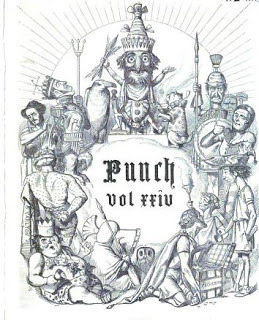 DEAR PUNCH.-I live in lodgings. I am one of those poor unfortunate helpless beings, called Bachelors, who are dependent for their wants and comforts upon the services of others. If I want the mustard, I have to ring half-a-dozen times for it; if I am waiting for my shaving water, I have to wander up and down the room for at least a quarter of an hour, with a soaped chin, before it makes its appearance.
DEAR PUNCH.-I live in lodgings. I am one of those poor unfortunate helpless beings, called Bachelors, who are dependent for their wants and comforts upon the services of others. If I want the mustard, I have to ring half-a-dozen times for it; if I am waiting for my shaving water, I have to wander up and down the room for at least a quarter of an hour, with a soaped chin, before it makes its appearance.
But this system of delay, this extreme backwardness in attending to one's simplest calls, is invariably shown a thousand times more backward about Christmas time. I am afraid to tell you what I have endured this
Christmas. My persecutions have been such as to almost make me wish that Christmas were blotted out of the Calendar altogether.
I have never been called in the morning at the proper time. My breakfast has always been served an hour later than usual—and as for dinner, it has been with difficulty that I have been able to procure any at all!
This invasion of one's habits and comforts is most heart-rending; and the only excuse I have been able to receive to my repeated remonstrances has been, 'Oh, Sir, you must really make some allowances; pray recollect, it is Christmas time.'
Last week I invited some friends to spend the evening with me—but I could give them neither tea, nor hot grog, nor supper, nor anything—because, ' Please, Sir, the servant has gone to the Pantomime—she's always allowed to go at Christinas time.'
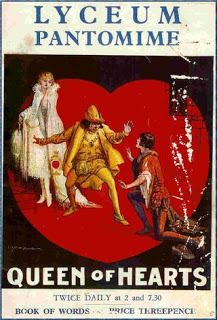
Hang this Christmas time! My canary died this morning. Upon inquiry I found that it had not had any seed or water for three days, Every one was so busy at. this time of the year. It was lucky, I thought, that I had some more expressive means of making my wants known than my poor starved canary, or else I should have shared its unhappy fate a week ago.
A day or two before Christmas Day my dress boots burst, and I sent them to be mended, with a pressing request that they might be sent home immediately. Well, Sir, from that day to this, I have never seen my dress boots. The only explanation I get to my frequent inquiries is, "Very sorry, Sir, but it is impossible, Sir, to get the men to work at this time of the year." It has been the same with a dress coat, which was split down the back. The tailor informs me, with a face as long as his pattern-book and containing nearly as many colours, that 'he regrets it extremely—but every one of his workmen have been drunk since Christmas Day - they always do at this period of the year.'
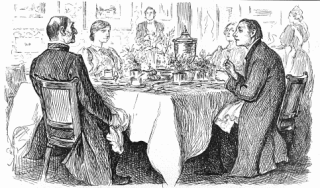
What has been the consequence, Sir? Why I have only one pair of dress-boots, one dress-coat. I am not ashamed to confess I cannot afford more. And the consequence has been, that I have not been able to accept many pleasant Christmas invitations, because I had not the proper attire to go in to them! Instead of amusing myself and others elsewhere, I have been obliged to mope at home over a sickly fire, expiring by inches for the want of a few nourishing coals, and without even a drop of hot water to make myself a comforting glass of grog. Servants, it would seem, have a time-honoured privilege to go out and do just as they please at Christmas time!
I suffered cold, incipient rheumatism, and violent tooth-ache, for three sleepless nights, because there was a broken window in my bedroom. I stamped, I swore, I rung the bell like a madman, but not a person could I get to put in a fresh pane for me. No: 'It was Christmas time, and the men wouldn't work, to please anybody.'
The worst yet remains. As I was out walking, a coalheaver knocked against me. He then abused me, and because I complained rather warmly, he bonnetted me, and ultimately knocked me down. I have still the marks of his brutality on both my eyes. Yet, Sir, will you believe it, this savage met me the following morning in Court; his wife was with him, and she said, half-crying, 'Her husband was very sorry, and so was she; but the fact was, he had taken a little drop too much, but she hoped I would excuse it—it was Christmas time.' Pretty compensation this to a man who has received a couple of black eyes !
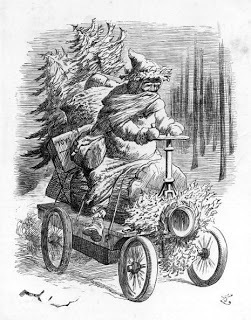
Now, Sir. it seems to me, from the above grievances, (and I have not enumerated one half of them), that Christmas is, with a certain class of people, a privileged period of the year to commit all sorts of excesses, to evade their usual duties, and to jump altogether out of their customary avocations into others the very opposite of them. For myself, I am extremely glad that Christmas does come but once a-year. I know I shall go, next December, to Constantinople, or Jerusalem, or the Minories, or some place where the savage customs I have described do not exist; for I would not endure another Christmas in England for any amount of holly, plum-pudding, or Christmas-boxes in the world.
I have the misfortune to remain, Mr. Punch,
Your much-persecuted Servant,
An Old Bachelor.
 DEAR PUNCH.-I live in lodgings. I am one of those poor unfortunate helpless beings, called Bachelors, who are dependent for their wants and comforts upon the services of others. If I want the mustard, I have to ring half-a-dozen times for it; if I am waiting for my shaving water, I have to wander up and down the room for at least a quarter of an hour, with a soaped chin, before it makes its appearance.
DEAR PUNCH.-I live in lodgings. I am one of those poor unfortunate helpless beings, called Bachelors, who are dependent for their wants and comforts upon the services of others. If I want the mustard, I have to ring half-a-dozen times for it; if I am waiting for my shaving water, I have to wander up and down the room for at least a quarter of an hour, with a soaped chin, before it makes its appearance.But this system of delay, this extreme backwardness in attending to one's simplest calls, is invariably shown a thousand times more backward about Christmas time. I am afraid to tell you what I have endured this
Christmas. My persecutions have been such as to almost make me wish that Christmas were blotted out of the Calendar altogether.
I have never been called in the morning at the proper time. My breakfast has always been served an hour later than usual—and as for dinner, it has been with difficulty that I have been able to procure any at all!
This invasion of one's habits and comforts is most heart-rending; and the only excuse I have been able to receive to my repeated remonstrances has been, 'Oh, Sir, you must really make some allowances; pray recollect, it is Christmas time.'
Last week I invited some friends to spend the evening with me—but I could give them neither tea, nor hot grog, nor supper, nor anything—because, ' Please, Sir, the servant has gone to the Pantomime—she's always allowed to go at Christinas time.'

Hang this Christmas time! My canary died this morning. Upon inquiry I found that it had not had any seed or water for three days, Every one was so busy at. this time of the year. It was lucky, I thought, that I had some more expressive means of making my wants known than my poor starved canary, or else I should have shared its unhappy fate a week ago.
A day or two before Christmas Day my dress boots burst, and I sent them to be mended, with a pressing request that they might be sent home immediately. Well, Sir, from that day to this, I have never seen my dress boots. The only explanation I get to my frequent inquiries is, "Very sorry, Sir, but it is impossible, Sir, to get the men to work at this time of the year." It has been the same with a dress coat, which was split down the back. The tailor informs me, with a face as long as his pattern-book and containing nearly as many colours, that 'he regrets it extremely—but every one of his workmen have been drunk since Christmas Day - they always do at this period of the year.'

What has been the consequence, Sir? Why I have only one pair of dress-boots, one dress-coat. I am not ashamed to confess I cannot afford more. And the consequence has been, that I have not been able to accept many pleasant Christmas invitations, because I had not the proper attire to go in to them! Instead of amusing myself and others elsewhere, I have been obliged to mope at home over a sickly fire, expiring by inches for the want of a few nourishing coals, and without even a drop of hot water to make myself a comforting glass of grog. Servants, it would seem, have a time-honoured privilege to go out and do just as they please at Christmas time!
I suffered cold, incipient rheumatism, and violent tooth-ache, for three sleepless nights, because there was a broken window in my bedroom. I stamped, I swore, I rung the bell like a madman, but not a person could I get to put in a fresh pane for me. No: 'It was Christmas time, and the men wouldn't work, to please anybody.'
The worst yet remains. As I was out walking, a coalheaver knocked against me. He then abused me, and because I complained rather warmly, he bonnetted me, and ultimately knocked me down. I have still the marks of his brutality on both my eyes. Yet, Sir, will you believe it, this savage met me the following morning in Court; his wife was with him, and she said, half-crying, 'Her husband was very sorry, and so was she; but the fact was, he had taken a little drop too much, but she hoped I would excuse it—it was Christmas time.' Pretty compensation this to a man who has received a couple of black eyes !

Now, Sir. it seems to me, from the above grievances, (and I have not enumerated one half of them), that Christmas is, with a certain class of people, a privileged period of the year to commit all sorts of excesses, to evade their usual duties, and to jump altogether out of their customary avocations into others the very opposite of them. For myself, I am extremely glad that Christmas does come but once a-year. I know I shall go, next December, to Constantinople, or Jerusalem, or the Minories, or some place where the savage customs I have described do not exist; for I would not endure another Christmas in England for any amount of holly, plum-pudding, or Christmas-boxes in the world.
I have the misfortune to remain, Mr. Punch,
Your much-persecuted Servant,
An Old Bachelor.
Published on December 17, 2010 01:19
Kristine Hughes's Blog
- Kristine Hughes's profile
- 6 followers
Kristine Hughes isn't a Goodreads Author
(yet),
but they
do have a blog,
so here are some recent posts imported from
their feed.



